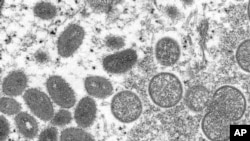The World Health Organization's European Secretary warned on Friday that monkeypox cases in the region have tripled in the last two weeks, a previously rare illness on the continent. We urged countries to do more to prevent them from becoming established.
And African health officials said they were treating the outbreak of monkeypox as an emergency, limiting vaccines to avoid the equity issues seen during the COVID-19 pandemic. We called on rich countries to share their supply.
WHO Europe Chief Dr. Hans Kluge said in a statement that despite last week's UN Health Organization decision, the expanding outbreak still justifies the declaration of a global health emergency. He said it wasn't.
"Urgent and collaborative action is essential to turn a corner in a race to reverse the ongoing epidemic of the disease," Kruge said.
According to the US Centers for Disease Control and Prevention, more than 5,000 cases of monkeypox have been reported from 51 countries around the world, and the disease is not usually reported. According to Kruge, the number of infections in Europe accounts for about 90% of the world total, and cases have been identified in 31 countries in WHO's European region.
Kluge states that 99% of cases are male, most of whom have sex with males, according to data reported to WHO. However, he said there were currently "small" cases among household contacts, including children. Most people reported symptoms such as rash, fever, malaise, myalgia, vomiting, and chills.
Scientists warn that anyone in close physical contact with monkeypox, clothing, or sheets is at risk of infection. Vulnerable populations such as children and pregnant women are considered more likely to have a serious illness.
Approximately 10% of patients were hospitalized for treatment or isolation, and one was admitted to the intensive care unit. No deaths have been reported.

Mr. Kruge said the issue of stigma in some countries could warn some people to seek medical care, WHO. Said to work with partners, including the organizers of gay pride events.
In the UK, with the largest outbreak of monkeypox beyond Africa, authorities have spread the disease to "a defined sexual network of men who have sex with gay, bisexual, or men." I point out that. British health officials said there were no signs of persistent infection beyond these populations.
WHO's chief adviser said in May that the surge in cases in Europe was likely related to male sexual activity at two rave parties in Spain and Belgium. Said.
Prior to this weekend's gay pride event in the UK, London's best public health doctors asked people with monkeypox symptoms such as swollen glands and blisters to stay home. ..
Nevertheless, in Africa, WHO is almost evenly divided between men and women, according to detailed data on cases of monkeypox in Ghana, of men having sex with men. It states that no spread has been detected between them.
WHO Europe Director Kruge also said that vaccine procurement "must apply the principles of equity."
The main vaccine used against monkeypox was originally developed for smallpox, and the European Medicines Agency this week evaluated whether monkeypox should be approved. Said it started. WHO states that the supply of Bavarian Scandinavian vaccines is very limited.
Countries, including the United Kingdom and Germany, have already begun vaccination against people at high risk of monkeypox. The UK has recently expanded its immunization program to most gay and bisexual men who have multiple sexual partners and are considered to be the most vulnerable.
Until May, monkeypox is not known to cause outbreaks across parts of Central and West Africa that have sickened people for decades, but in some countries Endemic and infected wildlife.
To date, there have been approximately 1,800 suspected monkeypox cases in Africa, including more than 70 deaths, but only 109 have been confirmed in the laboratory. Lack of diagnosis and weak monitoring in the laboratory means that many cases are undetected.
"For us, this particular outbreak means an emergency," said Ahmed Ogwell, Deputy Director of the Centers for Disease Control and Prevention in Africa.
According to WHO, monkeypox has spread to previously unseen African countries such as South Africa, Ghana and Morocco. However, according to Dr. Moeti Matshidiso, director of WHO Africa, more than 90% of continental infections occur in Congo and Nigeria.
No vaccine has been used to stop the outbreak of monkeypox in Africa. Authorities have relied primarily on contact tracing and quarantine.
WHO said that, like last year's scrambled COVID-19 vaccine, countries supplying monkeypox vaccines have not yet shared with Africa.
"No donations have been donated to (poor) countries," said Fiona Braca, who heads the WHO emergency response team in Africa. "We know that those countries that have some stocks reserve them primarily for their own population."
Matshidiso, WHO He said he was discussing with manufacturers and stockpiling countries to see if they would be shared.
"We hope that the global spotlight on monkeypox will act as a catalyst to completely defeat the disease in Africa," she said Thursday.


